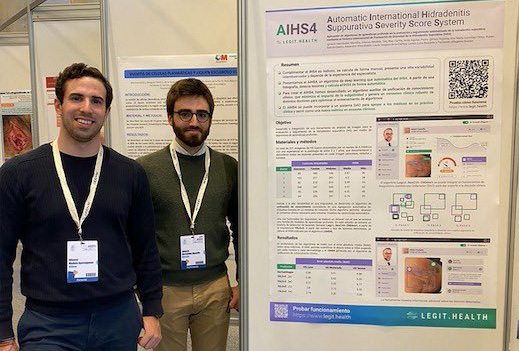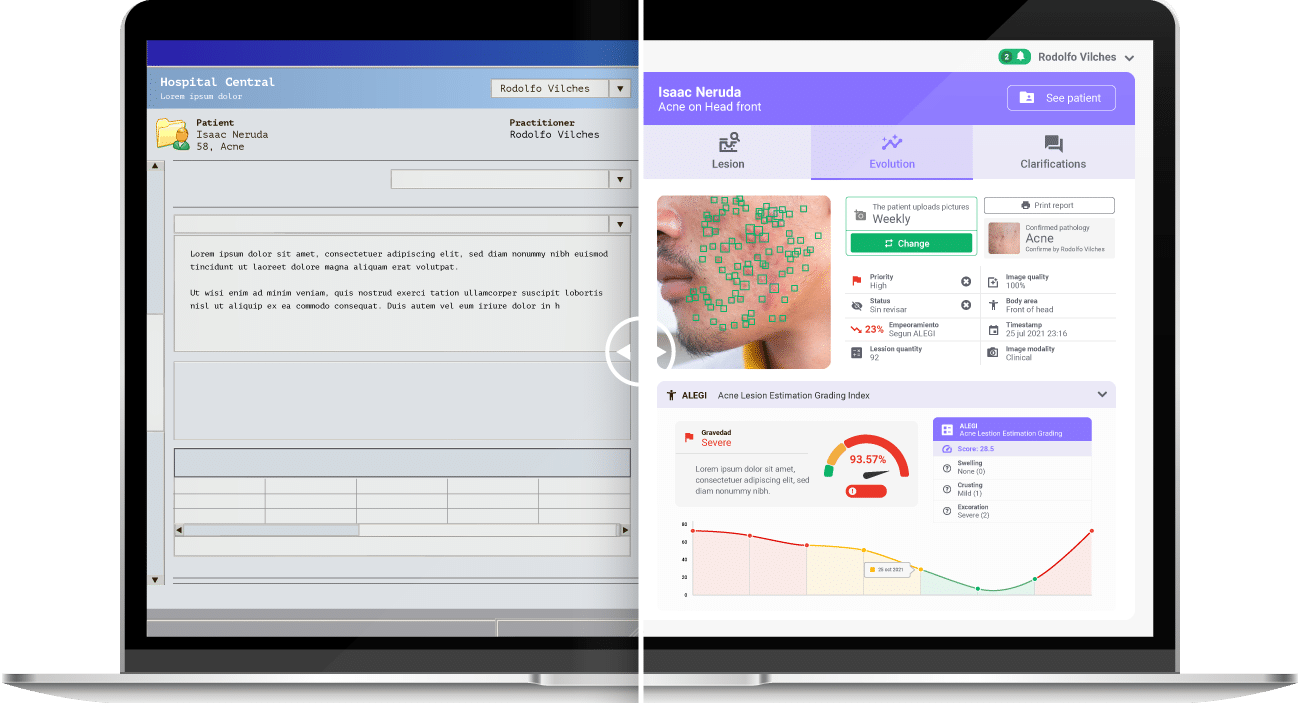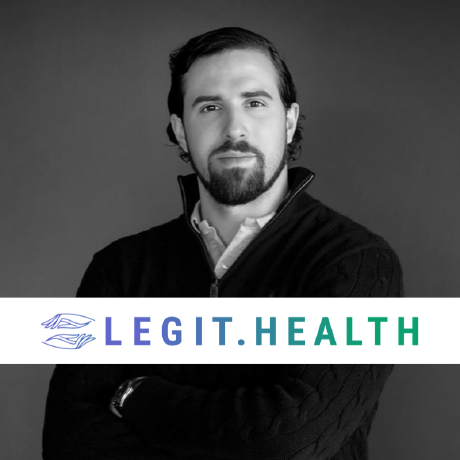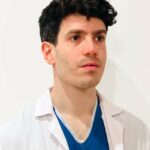Are Legit.Health's algorithms scientifically validated?
Introduction
As developers of healthcare technology, it's crucial to question the scientific grounding of new tools. In this article, we discuss the robust clinical validation and peer-review process our technology has undergone, reflecting our commitment to evidence-based solutions.
The publications listed here do not include all of our work. Nor do they include evidence submitted to certifying bodies as part of our certification process as a medical device. Thus, it's not an exhaustive list, but rather a summary of our most popular evidence.
Short answer
Yes, Legit.Health has been clinically validated in various healthcare settings by leading specialists in their fields. Our technology has demonstrated its effectiveness in enhancing diagnosis and follow-up, with specific studies focused on certain pathologies to assess sensitivity and precision.
Several of these studies are published in prestigious journals within dermatology, with others in varying stages of publication. Furthermore, we also provide clinical evidence during the process of certification as a medical device, some of which has not been made publicly available.
Do you want to see the clinical AI technology in action?
Detailed answer
The technology behind Legit.Health is complex and multifaceted. Behind a seemingly simple process for the user, several algorithms interact with each other. Indeed, our technology integrates multiple algorithms to not only diagnose and assess disease severity but also optimize referral accuracy, ensure image quality, and gauge treatment efficacy.
Atopic Dermatitis
Our ASCORAD (Automatic SCORing of Atopic Dermatitis) study, a collaboration with Dr. Ramon Grimalt, was published in the Journal of Investigative Dermatology (JID) Innovations. This study details our approach to automating severity assessment of atopic dermatitis and eczema.
Medela, A., Mac Carthy, T., Aguilar Robles, S. A., Chiesa-Estomba, C. M., & Grimalt, R. (2022). Automatic SCOring of Atopic Dermatitis Using Deep Learning: A Pilot Study. In JID Innovations (Vol. 2, Issue 3, p. 100107). Elsevier BV. https://doi.org/10.1016/j.xjidi.2022.100107
This work is further acknowledged in recent scientific literature, highlighting its potential to revolutionize AD severity assessment.
(...) very promising is the attempt to arrive at an automatic definition of AD severity by using CNNs (...) to achieve a scoring accuracy of erythema, papulation, excoriation, and lichenification severity comparable to that of dermatologists (...). Computational applicative advances in this direction have led to the more recent design of Automatic SCORing Atopic Dermatitis (ASCORAD).
Discover more about ASCORAD from its authors in this webinar (in Spanish).
In this video (in Spanish), Dr Ramon Grimalt and Alfonso Medela, both co-authors of the publication, explain what the paper is about.
Hidradenitis Suppurativa
The AIHS4, our novel system for scoring Hidradenitis Suppurativa, is detailed in Skin Research and Technology. This study exemplifies our commitment to developing practical AI solutions for complex dermatological conditions.
Hernández Montilla, I., Medela, A., Mac Carthy, T., Aguilar, A., Gómez Tejerina, P., Vilas Sueiro, A., González Pérez, A. M., Vergara de la Campa, L., Luna Bastante, L., García Castro, R., & Alfageme Roldán, F. (2023). Automatic International Hidradenitis Suppurativa Severity Score System (AIHS4): A novel tool to assess the severity of hidradenitis suppurativa using artificial intelligence. In Skin Research and Technology (Vol. 29, Issue 6). Wiley. https://doi.org/10.1111/srt.13357
The AIHS4 has been echoed in recent scientific publications, such as the following article by the National Research Council of Italy, and the Universities of Palermo and Messina:
(...) to overcome the IHS4, which is time-consuming and subject to variability, the AIHS4 is introduced, using a DL model, Legit.Health-IHS4net, for lesion detection (...). This evidence highlights the utility of AI in evidence-based dermatology, offering a potential tool to empower dermatologists in daily practice and clinical trials.
We also have presented the IHS4 in several congresses. For example, the following image shows our poster at the 2022 Spanish national dermatology congress (AEDV).
Legit.Health research team presenting the AIHS4 poster
Urticaria (Hives)
The Automatic Urticaria Activity Score (AUAS) system has been published in the Journal of Investigative Dermatology (JID) Innovations, showcasing our deep learning-based approach for urticaria severity assessment.
Mac Carthy, T., Hernández Montilla, I., Aguilar, A., García Castro, R., González Pérez, A. M., Vilas Sueiro, A., Vergara de la Campa, L., Alfageme, F., & Medela, A. (2024). Automatic Urticaria Activity Score: Deep Learning-Based Automatic Hive Counting for Urticaria Severity Assessment. In JID Innovations (Vol. 4, Issue 1, p. 100218). Elsevier BV. https://doi.org/10.1016/j.xjidi.2023.100218
Our work on the AUAS was presented at congresses such as the AEDV annual meeting in the year 2021. The following video shows a short explanation of the AUAS in the congress mentioned above:
In this video (in Spanish), Taig Mac Carthy, co-author of the publication, shares how the automatic UAS for urticaria works, at the annual congress of the Spanish Dermatology Academy.
Image Quality
We also publish our research regarding the non-diagnostic technology. Such is the case of the Dermatology Image Quality Assessment (DIQA) technology, which ensures the clinical utility of images for remote consultations and clinical trials. This was published in the Journal of the American Academy of Dermatology.
Hernández Montilla, I., Mac Carthy, T., Aguilar, A., & Medela, A. (2023). Dermatology Image Quality Assessment (DIQA): Artificial intelligence to ensure the clinical utility of images for remote consultations and clinical trials. In Journal of the American Academy of Dermatology (Vol. 88, Issue 4, pp. 927-928). Elsevier BV. https://doi.org/10.1016/j.jaad.2022.11.002
In this video (in Spanish), Taig Mac Carthy, co-author of the publication, shares how the referral artificial intelligence works, including the Image Quality Assurance, at the annual congress of the Spanish Dermatology Academy.
Oral communication at the annual congress of the Spanish Dermatology Academy (AEDV).
Psoriasis
Our work on the APASI, the Automatic Psoriasis Scoring System our team developed, got recognized by the AEDV with an award in the medical image category.

Other research
We also are pushing to implement our technology into new areas of medical knowledge, like the case of our collaboration with Dr Sergio Vañó and his team at the Ramon y Cajal Hospital, which are spearheading the application of AI technology to measure the severity of frontal fibrosing alopecia (FFA).
Another instance of Legit.Health's team expanding the scope of the deep learning algorithmic technology applied to medical since would be facial palsy. Dr. Goiztidi Díaz Basterra, Dr. Luis Barbier Herrero y Dra. Estíbaliz Ortiz de Zárate is leading an effort at the Basurto Hospital to apply this revolutionary technology to this field.
A good example would be the extensive clinical trial that Dr Leticia Calzado is leading at the Torrejon Hospital, where she and her team are validating the computer-assisted diagnosis process with excellent results.
Do you want to see the clinical AI technology in action?
In some cases, the promising results have pushed the research teams to expand the scope of the study. Like the study taking part in both the Cruces Hospital and Basurto Hospital under the scrutiny of Drs. Jesús Gardeazabal and Rosa María Izu Belloso studying the options of computer-assisted diagnosis in the case of Melanoma.

Work with us
At Legit.Health, we are working to further improve the technology, striving to create even better tools. This includes, for example, improving the differentiation between types of HS lesions, or ensuring that the technology works correctly across all skin phototypes.
If you would like to work with us, please fill out the following form and we will contact you as soon as possible.
This free 23-day trial of Legit.Health gives clinics and hospitals a hands-on look at how to drive increased adherence and improve patient outcomes, as well as improving efficiency and overall quality of life.




